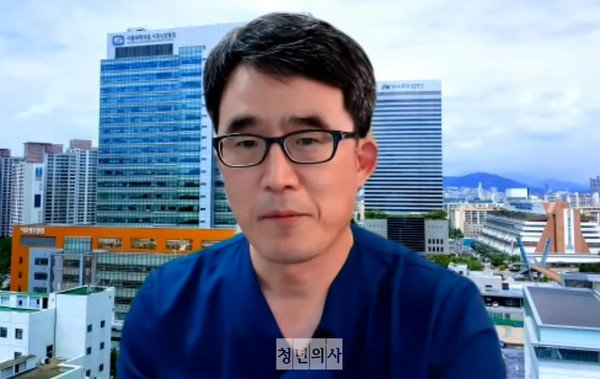“After finishing medical education and training, medical school students and interns say they don’t want to become surgeons even though they are interested in surgery and willing to learn more. Why do you think they say so?”
Professor Song Kyo-young of the Department of Surgery at Seoul St. Mary’s Hospital asked this question, saying that people should try to solve the problem of medical school students’ avoidance of particular departments from the perspective of the students and interns.
The issue recently emerged amid the government’s push to increase medical school admissions quotas and set up a new state-run medical school.
Song attributed the problem to surgeons' uncertain future, rather than demanding work at the surgery department.
Seoul St. Mary’s Hospital, one of the five largest hospitals in Korea where trainee doctors scramble to land a job, is suffering a shortage of applicants for the surgery department.

When hiring trainee physicians in November for 2020, the Catholic Medical Center, the parent hospital of Seoul St. Mary’s Hospital, could not hire surgeons sufficiently. The hospital looked for 15 surgeons but received only six applicants.
On a YouTube show on Friday, Song said the government was inaccurate about the shortage of doctors. “The government says we are short of doctors. But put it more accurately, we are not short of doctors as a whole but short of surgeons and cardiothoracic surgeons,” he said.
While the nation urgently needs specialists from particular departments that most doctors shun, filling up vacancies through increasing medical school admissions and establishing a public medical school will take more than 15 years, Song noted.
He took the example of being a specialist in the surgery department. “After graduating from a six-year medical school, you have to spend five years to get training as an intern and a resident, and two more years as a fellow doctor. A male needs three more years for the military service,” he said.
He questioned if the government’s plan would be effective in attracting more students to surgery. “No matter how much we succeed in increasing overall doctors, the number of surgeons will not increase unless we change the system where more surgery causes more losses,” he said.
Medical school students and interns picture a gloomy outlook for surgeons because surgeons do not get much reimbursement, Song explained.
If a specialist performs surgery for non-reimbursable services such as plastic surgery rather than life-saving operations, he or she could make more money. This is where students and trainee doctors feel discouraged from becoming a surgeon, he noted.
“Unless the reimbursement for surgery gets improved, future specialists will rarely choose surgery,” Song said.
Under the Korean reimbursement system, more surgery leads to more financial losses for hospitals. The distorted system is gradually reducing the number of large hospitals capable of operating seriously ill patients, the professor said.
According to Song, gastrectomy requires at least three doctors, including a surgeon and an anesthesiologist and nurses.
However, gastrectomy reimbursement is excessively low compared to the workforce and cost for the surgery. This is why hospitals cannot make profits by operating critically ill patients, he said. Which hospital would be willing to provide such surgery service if it costs 100 won but the hospital gets only 70 won, he asked.
Song said he has pointed out the problem for a long time, stressing the surgery department will attract more doctors if it gets appropriate compensation, but nothing has changed. However, the government did not even discuss the reimbursement issue but focused only on increasing doctors.
He also said that the government should approach the issue of enhancing the public health sector in the same way, saying more doctors does not lead to better public health. Surgeons shun hospitals that lack infrastructure, including operating rooms and surgery equipment. They prefer hospitals where patients are willing to get surgery, he said.
“Small hospitals or provincial institutions are mostly poorly equipped. So, surgeons there perform simple surgery only or even see outpatients only. Patients in rural areas with a serious disease requiring surgery prefer large hospitals in Seoul,” Song said. “Even if the government puts more doctors at public hospitals, failing to set up sufficient infrastructure will make patients avoid public medical institutions.”
The government’s plans to expand medical school admissions quotas and establish a public medical school were checkered with problems only, and he had no reason to support them, he said.

